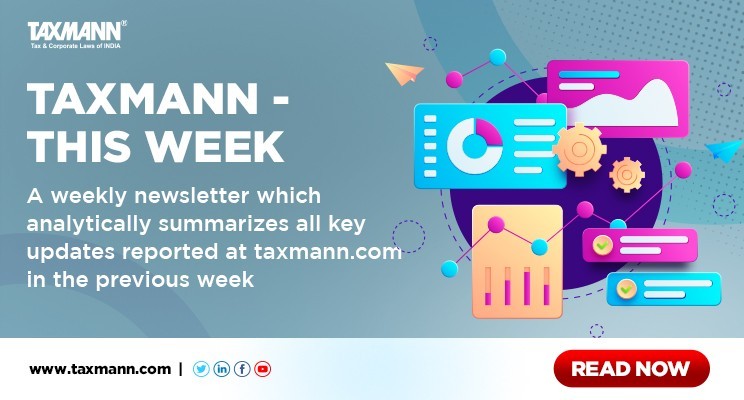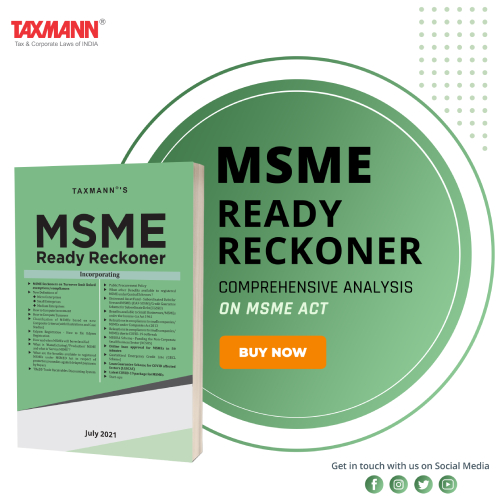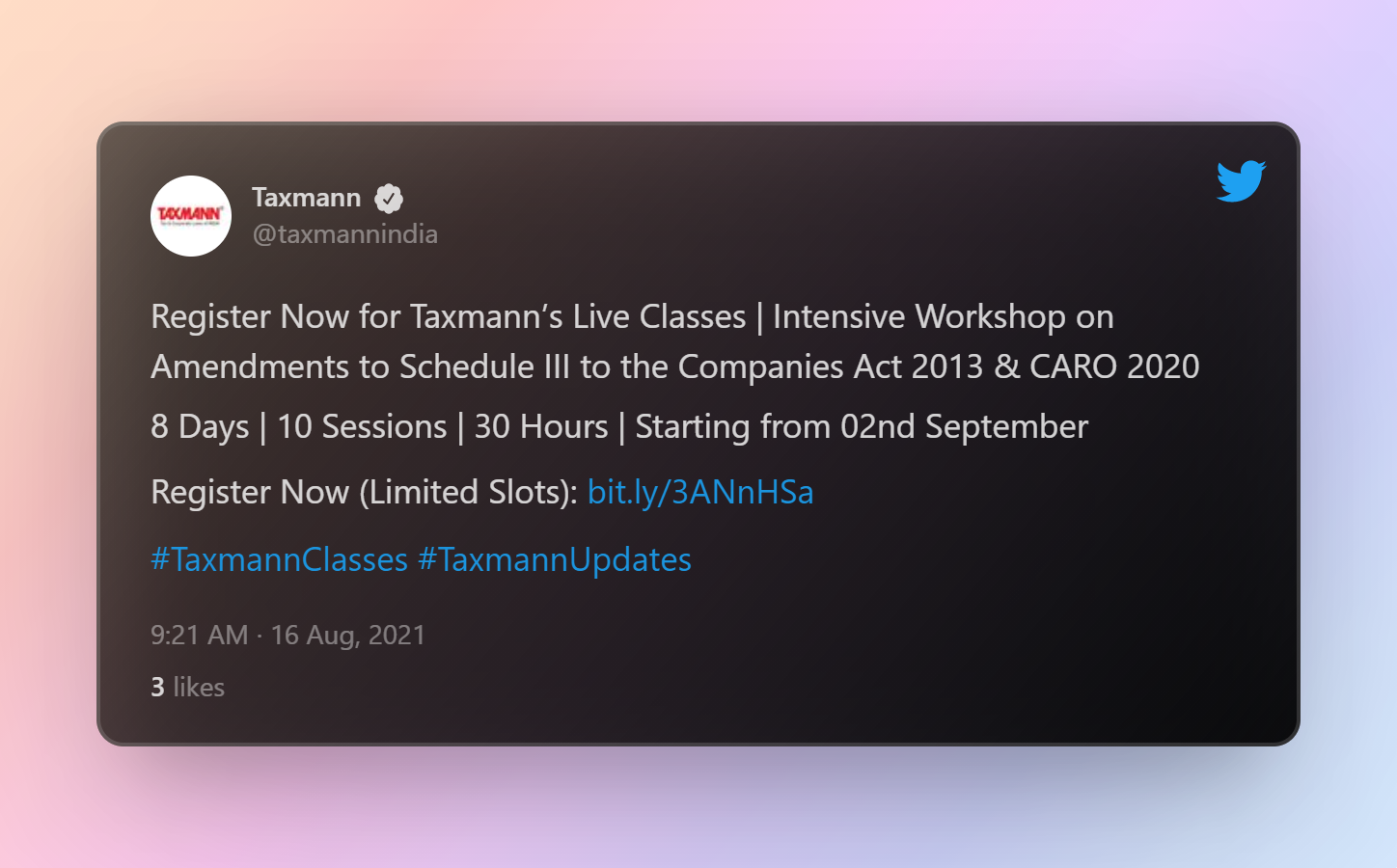Weekly Round-up on Tax & Corporate Laws | 16th to 21st Aug
- Blog|Weekly Round-up|
- 9 Min Read
- By Taxmann
- |
- Last Updated on 30 May, 2022

This weekly newsletter analytically summarizes the key stories reported at taxmann.com during the previous week from August 16th to August 21st 2021, namely:
(a) Different projects were treated as inter-connected for PE creation as there was unified agreement & consolidated billing pattern: Delhi ITAT
(b) CBDT prescribes ‘any other person’ for verification of ITR and for appearing before authorities on behalf of a company or an LLP
(c) Scheme for Remission of Duties and Taxes on Export Products (RoDTEP) notified
(d) Forfeiture of debentures was unjustified when Co. had the option to file a civil suit for recovery of the outstanding amount
(e) NCLT rules that MSME will be eligible to submit a resolution plan for his own company
(f) RoSCTL Scheme to be continued till March 31, 2024
(g) Recognition of spare parts and stores as Property, Plant and Equipment (PPE) in the books of accounts.
1. Diff. projects said to be inter-connected for PE creation if there was unified agreement and consolidated billing pattern
The Delhi Tribunal has ruled that the existence of PE of the assessee cannot be denied if the activities of assessee can be said to be inter-connected and inter-laced based on unified agreement and consolidated billing pattern.
Facts
Assessee was a tax resident of Norway. It had entered into Business Service Agreement with Unitech Wireless (Tamil Nadu) India P. Ltd. As per the BSA, the assessee provided services under independent Service Order Forms (SOFs) to Unitech Wireless. Assessee treated its income as a “fee for technical services” (FTS) and offered tax at the rate of 10% on a gross basis, relying on Article 13 of the DTAA between India and Norway.
However, the Assessing Officer (AO) held that the assessee had a PE in India in terms of Article 5(2)(1) of the Treaty. Time spent by employees of the assessee in India while rendering services to Unitech Wireless exceeded the threshold provided in that Article 5. Thus, such income would be taxable as per Article 7 of the Treaty. DRP also upheld the order of AO.
Aggrieved-assessee filed the instant appeal before the Tribunal. It was contended that the various SOFs constitute separate projects & activities and cannot be treated as single consolidated activities. The duration of stay of its employees, with respect to the various projects undertaken by it, does not exceed six months per project. Thus, Article 5 of the treaty wasn’t applicable in its case.
Ruling
The Delhi Tribunal held that the assessee raised bills on a quarterly basis. Consolidated invoices were raised irrespective of the SOFs under which the services were rendered. The common billing and the common payments give rise to the conclusion that there was a single contract.
Further, following the sequence of activities, it can be concluded that the activities consist of the same and interconnected projects. The activities of the assessee cannot be said that were unrelated to each other as none of the activities could stand in isolation from the other activity. No single activity can give rise to performance and achieving the purpose of the recipient.
The activities start with preparation, execution, and negotiation of the Global System for Mobile Communication (GSM) to devising the strategy development, preparation of IT solutions architect, benchmarking the same, recruiting the manpower for implementation, and training them for various activities in relation to GSM.
It was an apparent commercial coherence between the activities as no single activity mentioned above doesn’t serve any purpose individually when segregated. All these activities were a different facet of one seamless function. As defined in Article 5(2)(1), the project consists of a bundle of inter-connected and interrelated services with the underlying theme of completion of projects. In the instant case, the implementation of one SOF leads to the other, and it can be observed that they were well integrated. The outcome of one SOF becomes the inputs for the other SOF.
Thus, based on the unified agreement, consolidated billing pattern, the activities were found to be interrelated. Accordingly, the existence of the PE of the assessee was undeniable.
Read the Ruling
2. CBDT notifies Rules prescribing ‘any other person’ to verify ITR & appear before authorities for Co./LLP
A return of income can be verified by a person prescribed under Section 140 of the Income-tax Act. In respect of companies, the return can be signed and verified by the company’s Managing Director. However, suppose for any unavoidable reason the Managing Director cannot verify the return or where there is no Managing Director. In that case, the return may be verified by any director of the company. Similarly, in the case of an LLP, the return shall be verified by the designated partner thereof, or where for any unavoidable reason such designated partner is not able to verify the return, or where there is no designated partner as such, by any partner thereof. To remove the practical difficulties faced by taxpayers while filing of return of income, the Finance Act, 2020, has amended the provisions of Section 140 to enable any other person, as may be prescribed by the Board, to verify the return of income in the cases of a company and an LLP.
In exercise of such power, the CBDT has inserted a new Rule 12AA to prescribe the other person who can verify a company’s return and an LLP. This rule provides that any other person shall be the person, appointed by the National Company Law Tribunal (NCLT) for discharging the duties and functions of an interim resolution professional, a resolution professional, or a liquidator, as the case may be.
Further, Section 288 provides the list of the persons who can appear before any Income-tax Authority or the Appellate Tribunal, on behalf of an assessee, as his “authorized representative” for any of his income-tax proceedings.
Insolvency and Bankruptcy Code, 2016 empowers the Insolvency Professional or the Administrator to exercise the powers of the Board of Directors or corporate debtor to act as an “authorised representative” in front of the Adjudicating Authorities. Thus, the Finance Act, 2020 amended Section 288 to empower the CBDT to prescribe any other person who can appear as an authorized representative before the Income-tax authority.
In exercise of such power, the CBDT has inserted a new Rule 51B to prescribe the other person who can appear as an authorised representative. This rule provides that any other person, in respect of a company or an LLP shall be the person appointed by the NCLT for discharging the duties and functions of an interim resolution professional, a resolution professional, or a liquidator, as the case may be.
Read the Notification
3. Scheme for Remission of Duties and Taxes on Export Products (RoDTEP) notified
The Department of Commerce has notified scheme, guidelines, and rates under the Remission of Duties and Taxes on Export Products (RoDTEP). The scheme has been made part of the existing Foreign Trade Policy. Notably, necessary Rules, Procedures, priority sectors, etc., are yet to be notified.
RoDTEP scheme replaces the existing MEIS scheme with an objective to reimburse the taxes and duties incurred by the exporters such as Local Taxes, Coal Cess, Mandi Tax, Electricity Duties, tax on petroleum products for transportation of goods, etc. which are not getting exempted or refunded under any other existing scheme so that benefit of zero rates can be achieved. In this regard, Notification No. 19/2015-2020 dated 17th August 2021 has been issued.
Read the Notification
Bonus:
a. Watch Taxmann’s Latest Video on RoDTEP
b. Also, know all-about the brief background and key features of the RoDTEP Scheme, drafted by Taxmann’s Editorial Team
4. Forfeiture of debentures was unjustified when Co. had the option to file a civil suit for recovery of the outstanding amount
In the given case, the plaintiffs had applied for and were allotted Secured ‘Zero’ interest Fully Convertible Debentures (‘FCD’) of defendant-company. The plaintiffs were required to pay the value of debentures in three installments of Rs. 2,000 each. The debentures were to be converted into 100 shares of the face value of Rs. 10 with Rs. 50 as premium. The first installment was paid along with the application, and the second installment was also paid on receiving notice in this regard. The defendant received both installments.
However, a letter was received whereby the plaintiffs were informed that the company had forfeited the plaintiffs’ right to receive the equity shares and the principal amount paid by the plaintiffs thereof.
The plaintiffs contested the action of the defendant. However, no action was taken by the defendant company. It was claimed that the amount of the second call was sent by cheque. However, the cheque was returned, and therefore, the amount was sent by the draft, and as such, the defendant was not entitled to forfeit the right to receive shares.
The appellant-plaintiffs filed applications under Order IX, Rule 7 read with section 151 CPC, but the trial court rejected the said applications.
The trial court concluded that the plaintiffs had not indicated when did they receive the information and when the payment of the third installment was made. Therefore, only on account of the proceedings being ex-parte, the plaintiffs could not succeed and consequently dismissed the suits.
On being aggrieved, the second appeal had been filed by the defendant company. The Appellate Court held that as the company had power under Section 122 to file civil suits for recovery of an outstanding amount of debentures, it could not forfeit same on the ground of non-payment of installment. Since provisions of Section 122 provide for specific performance of a contract to subscribe for debentures and same can be enforced by a decree, action pertaining to allotment or forfeiture of debentures can be questioned before civil courts and, therefore, forfeiture of debentures by the company was unjustified
Read the Ruling
5. An MSME is eligible to submit a resolution plan for his own company: NCLT
In the instant case, a Corporate Insolvency Resolution Process (CIRP) was initiated against the corporate debtor, and a Resolution Professional (RP) was appointed.
As the CIRP period was going to expire, the applicant, and promoter of the corporate debtor, expressed willingness to participate in the resolution process by submitting a resolution plan.
RP rejected said application on the ground that in view of the bar contained under section 29A, the applicant was not eligible to participate in the resolution process
It was noted that the definition of MSMEs underwent a change vide notification dated 26-6-2020. As per the amended definition of MSME, the corporate debtor came within the purview of the revised definition of ‘medium enterprise’.
It was observed that since Section 240A exempts MSMEs from the application of clauses (c) and (h) of section 29A and allowed promoters of MSME’s to bid for their own company, considering a change in law related to MSME’s, the applicant was freed from ineligibility prescribed under clause (h) of section 29A, well within the period of CIRP and within the period when a person/entity could submit Resolution Plan and accordingly, was allowed to submit a resolution plan to RP
Read the Ruling
Bonus
a. Read: How to Register MSME on Government Portal for MSME? | Udyam Registration
b. Also, Check Out: Taxmann Latest Publication on MSME Act
6. RoSCTL Scheme to be continued till March 31, 2024
RoSCTL Scheme provides rebates from all Central and State Taxes on the export of Apparels or Garments under Chapter 62 and 63 and Made-ups under Chapter 63. The rebate is in the form of duty credit scrips. Earlier, the Government has decided to continue the RoSCTL Scheme till this scheme is merged with RoDTEP Scheme.
The Government has now notified that it will continue the RoSCTL Scheme until March 31, 2024. However, the eligibility criteria under RoSCTL shall remain unchanged. The other textile products which are not covered under the RoSCTL scheme shall be eligible to avail of the benefits, if any, under RoDTEP along with other products. In this regard, Notification No. 12015/11/2020-TTP dated 13th August 2021 has been issued.
Read the Notification
7. Whether spare parts and stores can be recognized as Property, Plant and Equipment (PPE) in the books of accounts?
P Ltd. is engaged in mining high-grade iron ore and manufacturing pallets and iron ore lumps. As a part of its business requirement, P Ltd. has maintained the stock of spare and store items. Until the adoption of Indian Accounting Standards (Ind AS), P Ltd. has accounted the above items of spares and stores as inventory. Those items of spares that are directly attributable to PPE have been disclosed as ‘Capital Spares’ under the head inventory.
On the adoption of Ind AS, P Ltd. has maintained consistency and disclosed the items of capital spares separately under the head inventory. Whether the accounting treatment adopted by P Ltd. in respect of such stores and spares is correct?
Answer
The Expert Advisory Committee (EAC) of ICAI has held that the accounting treatment adopted by P Ltd. is not correct.
As per Ind AS 16 Property, Plant and Equipment (PPE), only those items of tangible assets which are held for use in the production of goods or services, or rental to others, or administrative purposes, and are expected to be used during more than one period should be recognized as PPE.
Further, the items of spares and stores which meet the definition of PPE should be capitalized as PPE. Accordingly, P Ltd. should determine whether the spare items are used in day-to-day services and for general repair and maintenance. If yes, these should be accounted as inventory in the books of accounts.
In the instant case, few items of spares and stores are directly relatable to PPE. These should be recognized as PPE in the books, assuming their cost can be measured reliably.
Read the story
Also, Check Out: Taxmann’s Latest Ind AS Ready Reckoner
This book is a simple & practical workbook on Ind AS [as amended by the Companies (Indian Accounting Standards) Amendment Rules 2021] to guide the members in practice/employment in their day-to-day works. This book will help the professionals cope with various developments in the accounting standards’ area, which has become complex after Ind AS has started aligning with its global counterpart.
Register Now for Taxmann’s Live Classes!
Disclaimer: The content/information published on the website is only for general information of the user and shall not be construed as legal advice. While the Taxmann has exercised reasonable efforts to ensure the veracity of information/content published, Taxmann shall be under no liability in any manner whatsoever for incorrect information, if any.

Taxmann Publications has a dedicated in-house Research & Editorial Team. This team consists of a team of Chartered Accountants, Company Secretaries, and Lawyers. This team works under the guidance and supervision of editor-in-chief Mr Rakesh Bhargava.
The Research and Editorial Team is responsible for developing reliable and accurate content for the readers. The team follows the six-sigma approach to achieve the benchmark of zero error in its publications and research platforms. The team ensures that the following publication guidelines are thoroughly followed while developing the content:
- The statutory material is obtained only from the authorized and reliable sources
- All the latest developments in the judicial and legislative fields are covered
- Prepare the analytical write-ups on current, controversial, and important issues to help the readers to understand the concept and its implications
- Every content published by Taxmann is complete, accurate and lucid
- All evidence-based statements are supported with proper reference to Section, Circular No., Notification No. or citations
- The golden rules of grammar, style and consistency are thoroughly followed
- Font and size that’s easy to read and remain consistent across all imprint and digital publications are applied








 CA | CS | CMA
CA | CS | CMA
